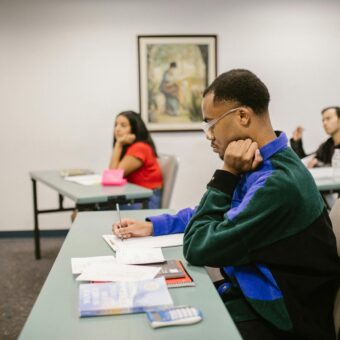By Kunal Chan Mehta Article Date: 31 May 2022
FSB students were invited to Scotland Yard to speak about a series of topical and personal subjects on youth crime and violent crime with Assistant Commissioner Nick Ephgrave – the individual with one of the biggest jobs in British policing.
Speaking about the interview, George Washington, Student Union President of FSB’s Croydon campus, said: ‘I thank Assistant Commissioner Nick Ephgrave for his commitment, dedication, and sense of duty. I was extremely impressed with his standards on police professionalism, diversity, and performance. Our discussion opened my eyes to the deep complexities involved in combatting crime.’
‘After a long two-year lockdown hiatus, it was time to have a sensible debate in person with those leading the police service,’ said Cristina Ciachir, a Business student at FSB’s Croydon campus. ‘Our discussion has ignited a lot of ideas with us. We are now creating several social marketing campaigns on anti-knife and gang crime.’
Providing policing leadership to deal with the crimes that are affecting people now and into the future is not so straightforward. It takes solid leadership, integrity, innovation, and transformation that is widely supported by a vast network of stakeholders. With shifts in public perception, feelings of safety and confidence in the police services, policing cannot be reformed by policy alone. On paper, policy means very little to policy on the ground – in that policing on the ground is often spontaneous and unsupervised.
During the August 2011 Croydon riots, we saw how much communities relied on the police and came together to help in the clear up. We saw unity, active consent, and public co-creation to help the police restore order. Yet, too often, the good and heroic work that police officers undertake goes unrecognised and unnoticed. I leave you with a thought, would you confront a drunk person armed with a beer bottle outside your home at 1 am? The police will, on your behalf, for your safety and protection – and that is – among many other things – a service to be grateful for.
Please email the author of this article kunal.mehta@fairfield.ac for any questions or comments or to find out more about participating in our upcoming student anti-knife crime campaigns and webinars.
Police careers
There are various ways to join the police across the UK, depending on your work, life, and educational experience. The Met is recruiting now and welcomes applications from people of all backgrounds, visit www.met.police.uk/newpcs for more information about the role and how to join. For other police forces visit www.joiningthepolice.co.uk.
